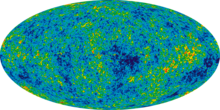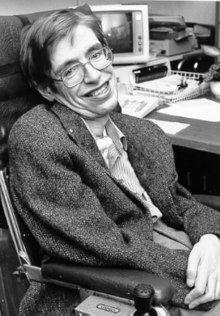
Back Stephen Hawking Afrikaans Stephen Hawking ALS ስቲቨን ሃውኪንግ Amharic Stephen Hawking AN स्टीफन हॉकिंग ANP ستيفن هوكينج Arabic ستيفن هوكينج ARZ ষ্টিফেন হকিং Assamese Stephen Hawking AST Стивен Гьокинг AV
| Part of a series on |
| Physical cosmology |
|---|
 |
Stephen William Hawking (8 January 1942 – 14 March 2018) was an English theoretical physicist, cosmologist, and author who was director of research at the Centre for Theoretical Cosmology at the University of Cambridge.[6][17][18] Between 1979 and 2009, he was the Lucasian Professor of Mathematics at Cambridge, widely viewed as one of the most prestigious academic posts in the world.[19]
Hawking was born in Oxford into a family of physicians. In October 1959, at the age of 17, he began his university education at University College, Oxford, where he received a first-class BA degree in physics. In October 1962, he began his graduate work at Trinity Hall, Cambridge, where, in March 1966, he obtained his PhD degree in applied mathematics and theoretical physics, specialising in general relativity and cosmology. In 1963, at age 21, Hawking was diagnosed with an early-onset slow-progressing form of motor neurone disease that gradually, over decades, paralysed him.[20][21] After the loss of his speech, he communicated through a speech-generating device, initially through use of a handheld switch, and eventually by using a single cheek muscle.[22]
Hawking's scientific works included a collaboration with Roger Penrose on gravitational singularity theorems in the framework of general relativity, and the theoretical prediction that black holes emit radiation, often called Hawking radiation. Initially, Hawking radiation was controversial. By the late 1970s, and following the publication of further research, the discovery was widely accepted as a major breakthrough in theoretical physics. Hawking was the first to set out a theory of cosmology explained by a union of the general theory of relativity and quantum mechanics. He was a vigorous supporter of the many-worlds interpretation of quantum mechanics.[23][24]
Hawking achieved commercial success with several works of popular science in which he discussed his theories and cosmology in general. His book A Brief History of Time appeared on the Sunday Times bestseller list for a record-breaking 237 weeks. Hawking was a Fellow of the Royal Society, a lifetime member of the Pontifical Academy of Sciences, and a recipient of the Presidential Medal of Freedom, the highest civilian award in the United States. In 2002, Hawking was ranked number 25 in the BBC's poll of the 100 Greatest Britons. He died in 2018 at the age of 76, having lived more than 50 years following his diagnosis of motor neurone disease.
- ^ a b c d e f g h i j k l m Cite error: The named reference
mathgenewas invoked but never defined (see the help page). - ^ Ferguson 2011, p. 29.
- ^ Cite error: The named reference
allenphdwas invoked but never defined (see the help page). - ^ Cite error: The named reference
boussophdwas invoked but never defined (see the help page). - ^ Cite error: The named reference
carrphdwas invoked but never defined (see the help page). - ^ a b c d Bernard Carr; George F. R. Ellis; Gary Gibbons; James Hartle; Thomas Hertog; Roger Penrose; Malcolm Perry; Kip S. Thorne (July 2019). "Stephen William Hawking CH CBE. 8 January 1942—14 March 2018". Biographical Memoirs of Fellows of the Royal Society. 66: 267–308. arXiv:2002.03185. doi:10.1098/RSBM.2019.0001. ISSN 0080-4606. S2CID 131986323. Wikidata Q63347107.
- ^ Cite error: The named reference
dowkerphdwas invoked but never defined (see the help page). - ^ Cite error: The named reference
galfardphdwas invoked but never defined (see the help page). - ^ Cite error: The named reference
gibbonsphdwas invoked but never defined (see the help page). - ^ Cite error: The named reference
hertogphdwas invoked but never defined (see the help page). - ^ Cite error: The named reference
laflammephdwas invoked but never defined (see the help page). - ^ Cite error: The named reference
pagephdwas invoked but never defined (see the help page). - ^ Cite error: The named reference
perryphdwas invoked but never defined (see the help page). - ^ Taylor-Robinson, Marika Maxine (1998). Problems in M theory. lib.cam.ac.uk (PhD thesis). University of Cambridge. OCLC 894603647. EThOS uk.bl.ethos.625075. Archived from the original on 1 May 2018. Retrieved 1 May 2018.
- ^ Cite error: The named reference
wuphdwas invoked but never defined (see the help page). - ^ Shirbon, Estelle (20 March 2018). "Stephen Hawking to Join Newton, Darwin in Final Resting Place". London: Reuters. Archived from the original on 21 March 2018. Retrieved 21 March 2018.
- ^ Cite error: The named reference
Auto2J-2was invoked but never defined (see the help page). - ^ Cite error: The named reference
Auto2J-3was invoked but never defined (see the help page). - ^ "Michael Green to become Lucasian Professor of Mathematics". The Daily Telegraph. Archived from the original on 25 May 2019. Retrieved 11 December 2012.
- ^ "Mind over matter: How Stephen Hawking defied Motor Neurone Disease for 50 years". The Independent. 26 November 2015. Archived from the original on 23 August 2017. Retrieved 15 September 2017.
- ^ "How Has Stephen Hawking Lived to 70 with ALS?". Scientific American. 7 January 2012. Archived from the original on 30 August 2015. Retrieved 23 December 2014.
Q: How frequent are these cases of very slow-progressing forms of ALS? A: I would say probably less than a few percent.
- ^ Stephen Hawking: An inspirational story of willpower and strength. Swagatham Canada https://www.swagathamcanada.com/inspirational/stephen-hawking-an-inspirational-story-of-willpower-and-strength/ Archived 6 November 2021 at the Wayback Machine 26 October 2021
- ^ Gardner, Martin (September/October 2001). "Multiverses and Blackberries" Archived 28 July 2016 at the Wayback Machine. "Notes of a Fringe-Watcher". Skeptical Inquirer. Volume 25, No. 5.
- ^ Price, Michael Clive (February 1995). "THE EVERETT FAQ" Archived 20 April 2016 at the Wayback Machine. Department of Physics, Washington University in St. Louis. Retrieved 17 December 2014.

